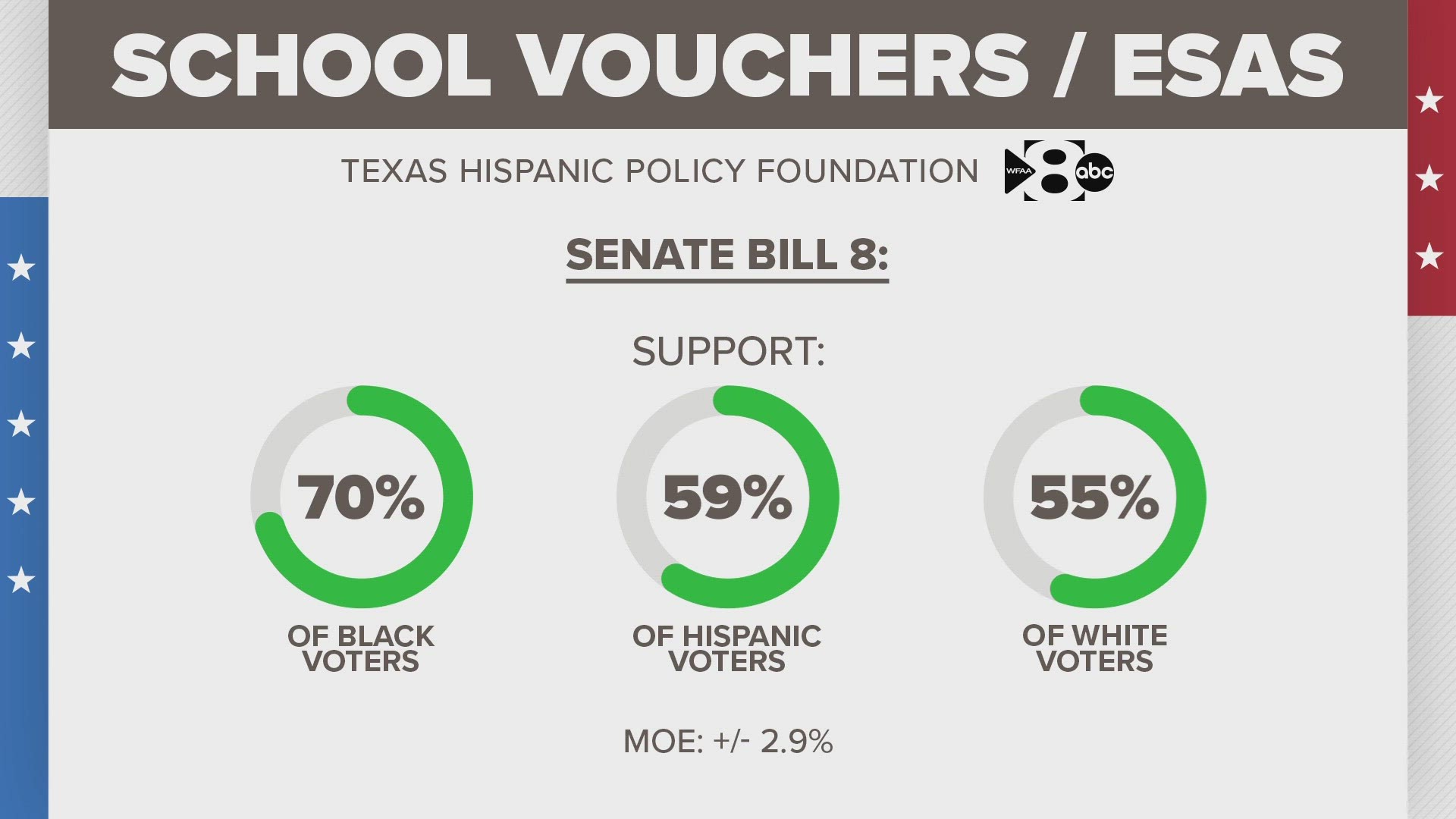DALLAS — Even as school vouchers, also known as education savings accounts, do not appear to have the votes to pass the state legislature right now, a poll by the Texas Hispanic Policy Foundation and WFAA shows a majority of Texans want to expand school choice and allow parents to use tax dollars to send their children to private school.
The survey of 1,000 registered voters released on Monday, shows 58% support the concept, known legislatively as Senate Bill 8, while 42% oppose it.
“Texans tend to support the socially conservative bills that state and legislative leaders are pushing this year,” said Dr. Mark Jones, TxHPF Director of Research and Analytics. “While these bills generate a very contentious debate and some fierce opposition, they are supported by fairly wide margins when you look at all Texas voters.”
Supporters rebranded school vouchers as education savings accounts this legislative session and introduced them as Senate Bill 8. The concept remains the same, where parents of some Texas students get to use public tax dollars to send their child to a private school.
It’s a priority for Lt. Gov. Dan Patrick and Gov. Greg Abbott but suburban and rural Republicans in the Texas House of Representatives continue to reject the idea, like they have for years, fearing the impact it could have on public schools in their districts.
Still, the TxHPF/WFAA poll shows 70% of Black voters back the ESA option, 59% of Hispanic voters do, as well, along with 55% of white Texans.
The survey had a margin of error of 2.09%.
Reducing the state’s unsustainable property taxes was another priority going into this legislative session that has yet to be solved.
With seven days left before state lawmakers adjourn the 88th regular legislative session, the TxHPF/WFAA poll shows extensive support for both the House and Senate proposals – signaling that homeowners want lawmakers to do something to lower property taxes.
Texas has the seventh highest property taxes in the United States, according to HomeAdvisor. The majority of local property taxes pays for public schools. The rest is broken up to city and county government, public hospitals, municipal utility districts and more.
In the survey, when forced to choose between the Senate’s property tax bill, SB 3, and the one in the House of Representatives, HB 2, 85% of Texans said they support SB 3, which will raise the homestead exemption from $40,000 to $70,000 for those under 65 and the exemption would increase to $100,000 for people 65 and older.
The House version, which would lower the annual appraisal caps from 10% to 5% for residential property and extend this benefit to commercial property, has 86% support.
“Texans certainly support property-tax relief,” said TxHPF President Jason Villalba, a former Republican state representative from Dallas. “There is more support for expanding the homestead exemption than there is for lower appraisal caps, but both ideas are very popular. Given the significant burdens that high property taxes place on Texas families, it should come as no surprise that both the Senate and the House tax proposals receive strong bipartisan support. The data from this report makes that clear.”
In addition, the TxHPF/WFAA poll also found:
-- 60% of Texans oppose (38%) House Bill 2127, which would preempt some local regulations.
-- Older Texans belonging to the Baby Boomer/Silent Generation (74%) and Generation X (67%) are much more likely to oppose HB 2127 than Millennials (42%) and Generation Z (35%)
-- 67% of Democrats and Independents oppose HB 2127 as do 51% of Republicans.
-- 65% of Texans support Senate Bill 20, which would allow for the removal of district attorneys that have a blanket policy of refusing to prosecute entire classes of crimes under Texas law.
-- 85% of Republicans support SB 20 compared to 66% of Independents and 43% of Democrats.
The survey was conducted between May 8 and May 17.
Methodology: The distribution of the registered voters based on their ethnic/racial self-identification is 58% white/Anglo, 23% Hispanic/Latino, 13% Black/African American and 6% with a mixed or other ethnic/racial identity. The gender distribution of the population is 53% women and 47% men. In regard to generations, 37% of the population belongs to the combined Silent Generation (born between 1928 and 1945) and Baby Boomers (1946-1964) cohort, 25% to Generation X (1965-1980), 27% to the Millennial (1981-1996) generation and 11% to Generation Z (1997-2005). The partisan identification of this population is 43% Republican, 42% Democrat, 12% Independent and 3% Unsure. Among the respondents who voted in the 2020 presidential election, 51.3% voted for Donald Trump, 46.9% for Joe Biden and 1.8% for minor party candidates.

